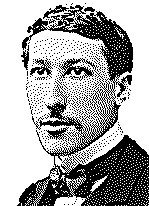
René Guénon in 1925
The Conservative critique of modernity is by no means a recent phenomenon; it begins rather with the responders to Jean-Jacques Rousseau and his Jacobin followers in the late Eighteenth Century. It is sufficient in this regard to mention the names of
Edmund Burke (1729 – 1797) and
Joseph de Maistre (1753 – 1821) and of their successors,
S. T. Coleridge (1772 – 1834) and
François-René de Chateaubriand (1768 – 1848), to suggest the range and richness of immediately post-revolutionary conservative discourse. In the Twentieth Century,
José Ortega y Gassett (1883 – 1955),
Oswald Spengler (1886 – 1936), and
T. S. Eliot (1888 – 1965), among others, continued in the line established by French
réactionisme. In Ortega’s case and in Spengler’s this continuation entailed incorporating the iconoclastic skepticism of Friedrich Nietzsche into the discourse qualifiedly. In Eliot’s case, it meant rejecting Nietzsche’s atheism and taking up from Chateaubriand and Coleridge the apology for Christian revelation and for a theological, as opposed to a secular, view of existence. René Guénon (1886 – 1951) belongs by his dates with the generation of Ortega, Spengler, and Eliot; like Eliot, Guénon is a theist, but despite his favorable treatment of Catholicism he is less identifiably Christian than Eliot. Guénon sees Catholicism as the vessel of tradition in the West, but elsewhere tradition has
other forms that are valid in their own contexts.
[i]
Spengler’s Decline of the West undoubtedly made an impression on Guénon, much as it did on Guenon’s younger contemporary Julius Evola (1898 – 1974). Guénon and Evola knew each other and mutually influenced one other.[ii] Both Guénon and Evola together exemplify a branch of modern critical anti-modernism affiliated much more than casually with the Twentieth Century occult revival. Guénon at one time, in the 1920s, edited the chief French-language occult periodical, LaGnose or “Gnosis.” Yet Guénon, a fierce un-masker of religious mountebanks, can hardly be accused of employing mystic obscurantism to push a doctrinaire agenda. Guénon’s interest in occult topics, even more than Evola’s, strikes one as rigorous and objective. As for Guénon’s awareness of ideological deformations of reality, it ran to the acute. The driving force of deformation, in Guénon’s analysis as in Evola’s, is the stultifying massiveness of modern society, with its conformism on an unprecedented scale, and its receptivity to oratorical manipulation.
continue reading

![]()





















